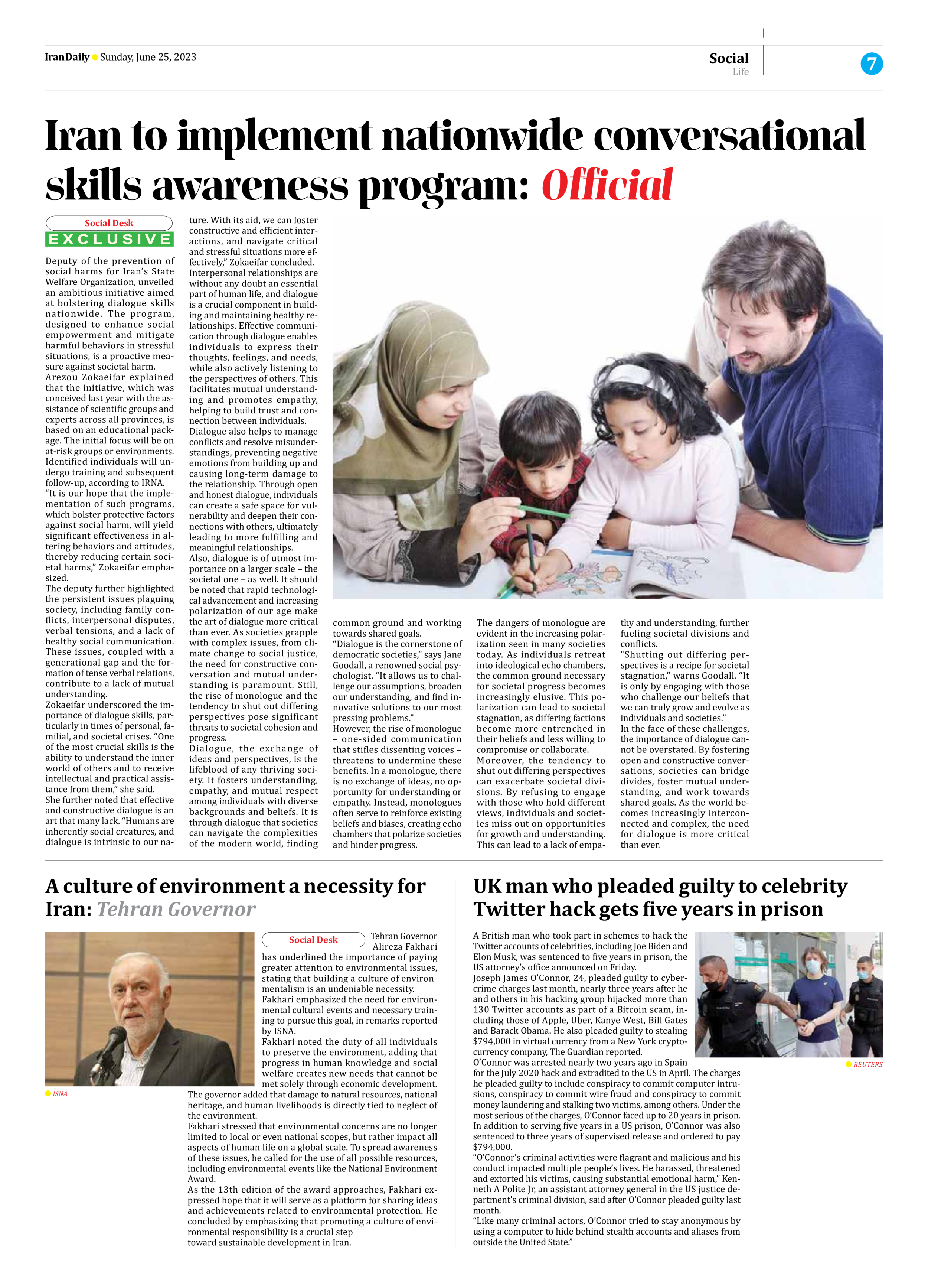
Iran to implement nationwide conversational skills awareness program: Official
Deputy of the prevention of social harms for Iran’s State Welfare Organization, unveiled an ambitious initiative aimed at bolstering dialogue skills nationwide. The program, designed to enhance social empowerment and mitigate harmful behaviors in stressful situations, is a proactive measure against societal harm.
Arezou Zokaeifar explained that the initiative, which was conceived last year with the assistance of scientific groups and experts across all provinces, is based on an educational package. The initial focus will be on at-risk groups or environments. Identified individuals will undergo training and subsequent follow-up, according to IRNA.
“It is our hope that the implementation of such programs, which bolster protective factors against social harm, will yield significant effectiveness in altering behaviors and attitudes, thereby reducing certain societal harms,” Zokaeifar emphasized.
The deputy further highlighted the persistent issues plaguing society, including family conflicts, interpersonal disputes, verbal tensions, and a lack of healthy social communication. These issues, coupled with a generational gap and the formation of tense verbal relations, contribute to a lack of mutual understanding.
Zokaeifar underscored the importance of dialogue skills, particularly in times of personal, familial, and societal crises. “One of the most crucial skills is the ability to understand the inner world of others and to receive intellectual and practical assistance from them,” she said.
She further noted that effective and constructive dialogue is an art that many lack. “Humans are inherently social creatures, and dialogue is intrinsic to our nature. With its aid, we can foster constructive and efficient interactions, and navigate critical and stressful situations more effectively,” Zokaeifar concluded.
Interpersonal relationships are without any doubt an essential part of human life, and dialogue is a crucial component in building and maintaining healthy relationships. Effective communication through dialogue enables individuals to express their thoughts, feelings, and needs, while also actively listening to the perspectives of others. This facilitates mutual understanding and promotes empathy, helping to build trust and connection between individuals.
Dialogue also helps to manage conflicts and resolve misunderstandings, preventing negative emotions from building up and causing long-term damage to the relationship. Through open and honest dialogue, individuals can create a safe space for vulnerability and deepen their connections with others, ultimately leading to more fulfilling and meaningful relationships.
Also, dialogue is of utmost importance on a larger scale – the societal one – as well. It should be noted that rapid technological advancement and increasing polarization of our age make the art of dialogue more critical than ever. As societies grapple with complex issues, from climate change to social justice, the need for constructive conversation and mutual understanding is paramount. Still, the rise of monologue and the tendency to shut out differing perspectives pose significant threats to societal cohesion and progress.
Dialogue, the exchange of ideas and perspectives, is the lifeblood of any thriving society. It fosters understanding, empathy, and mutual respect among individuals with diverse backgrounds and beliefs. It is through dialogue that societies can navigate the complexities of the modern world, finding common ground and working towards shared goals.
“Dialogue is the cornerstone of democratic societies,” says Jane Goodall, a renowned social psychologist. “It allows us to challenge our assumptions, broaden our understanding, and find innovative solutions to our most pressing problems.”
However, the rise of monologue – one-sided communication that stifles dissenting voices – threatens to undermine these benefits. In a monologue, there is no exchange of ideas, no opportunity for understanding or empathy. Instead, monologues often serve to reinforce existing beliefs and biases, creating echo chambers that polarize societies and hinder progress.
The dangers of monologue are evident in the increasing polarization seen in many societies today. As individuals retreat into ideological echo chambers, the common ground necessary for societal progress becomes increasingly elusive. This polarization can lead to societal stagnation, as differing factions become more entrenched in their beliefs and less willing to compromise or collaborate.
Moreover, the tendency to shut out differing perspectives can exacerbate societal divisions. By refusing to engage with those who hold different views, individuals and societies miss out on opportunities for growth and understanding. This can lead to a lack of empathy and understanding, further fueling societal divisions and conflicts.
“Shutting out differing perspectives is a recipe for societal stagnation,” warns Goodall. “It is only by engaging with those who challenge our beliefs that we can truly grow and evolve as individuals and societies.”
In the face of these challenges, the importance of dialogue cannot be overstated. By fostering open and constructive conversations, societies can bridge divides, foster mutual understanding, and work towards shared goals. As the world becomes increasingly interconnected and complex, the need for dialogue is more critical than ever.







